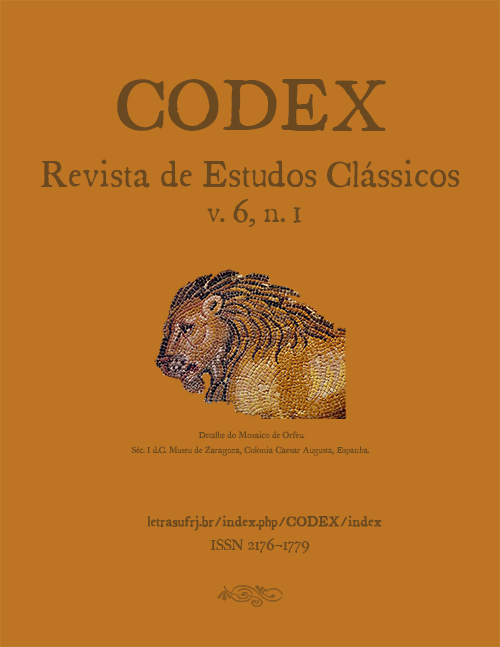Heracles and the Interlocution with the Numen
DOI:
https://doi.org/10.25187/codex.v6i1.18204Keywords:
-- Greek Tragedy, Euripides, Heracles, Numen, JusticeAbstract
The plot of Heraclestragedy by Euripides is composed of three parts: in the first one, Heracles' family is under threat of death by the tyrant Lykos and anxiously awaits the return of the hero from his latest mission; in the second part, Heracles returns and kills the tyrant; and in the third one, Heracles -- possessed by Lyssa -- kills his own family, and when he regains consciousness of his terrible deed, he plans to commit suicide, but he is persuaded by his friend Theseus to accept his misfortune and endure the pain of living under the weight of his fault. Traditional criticism has seen lack of unity in this composition by juxtaposition. In this paper, we intend to show it is possible to see the unity of this tragedy in the perfect interweaving of the question of justice and dialogue with Numen. And, naturally, try to answer what notion of justice is shown in the development of the plot, and how this notion intertwines with Numen's interlocution.Downloads
References
BARLOW, Shirley A. Structure and Dramatic Realism in Euripides' Heracles. In: McAUSLAN, Ian & WALCOT, Peter. Greek Tragedy. Oxford University Press, 1993, pp. 153-165.
EURIPIDES. Heracles with Introduction and Commentary by Godfrey W. Bond. Oxford Clarendon Press, 1988.
EURIPIDES. Heracles with Introduction Translation and Commentary by Shirley A. Barlow. Warminster, Aris & Phillips, 1998.
EVRIPIDIS. Fabulae Edidit J. Diggle. Tomus II insunt Supplices, Electra, Hercules, Troades, Iphigenia in Tauris, Ion. Oxford Classical Text, 1981.
Downloads
Published
How to Cite
Issue
Section
License
This work is licensed under a Creative Commons Attribution-NonCommercial 4.0 International License.










